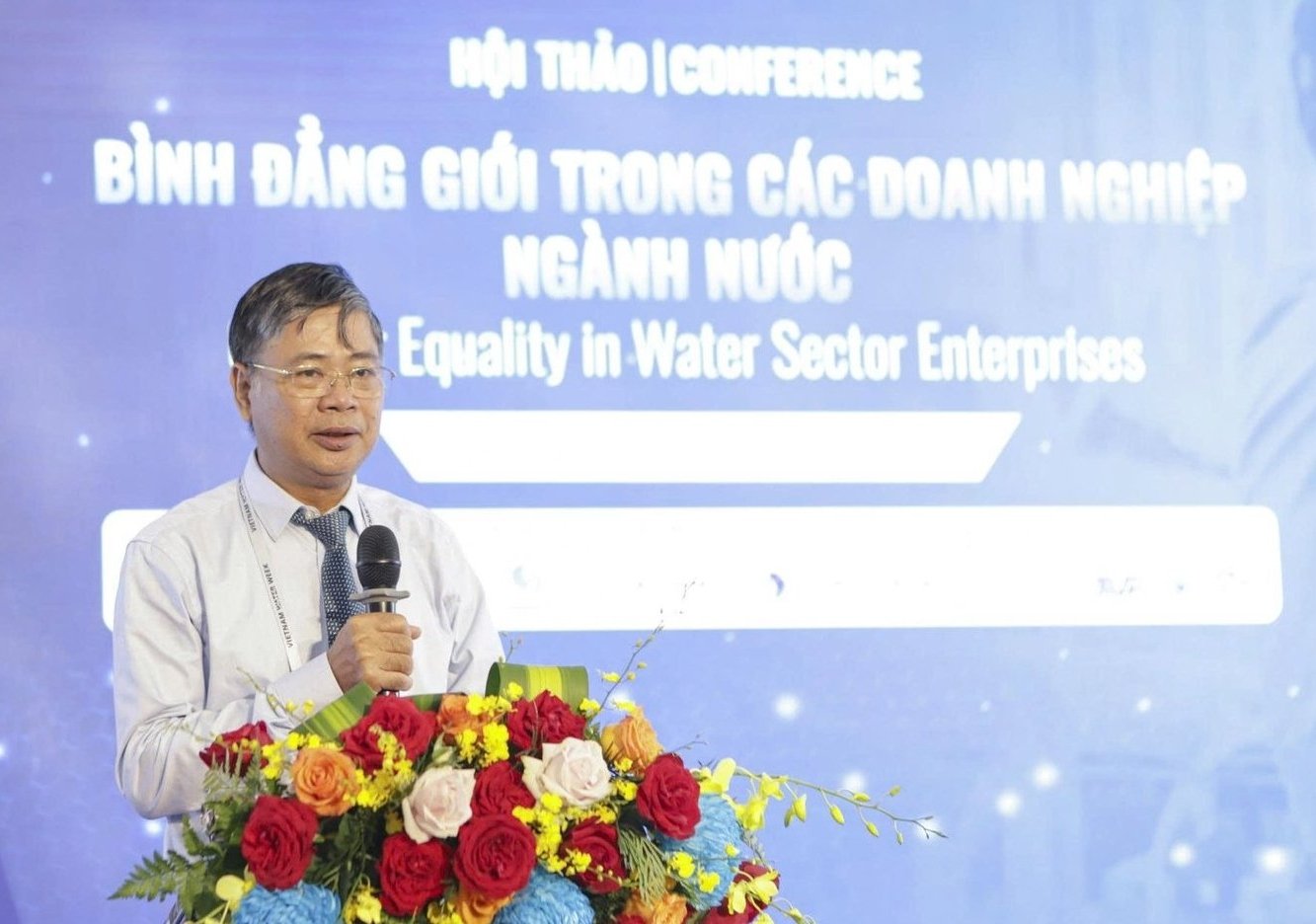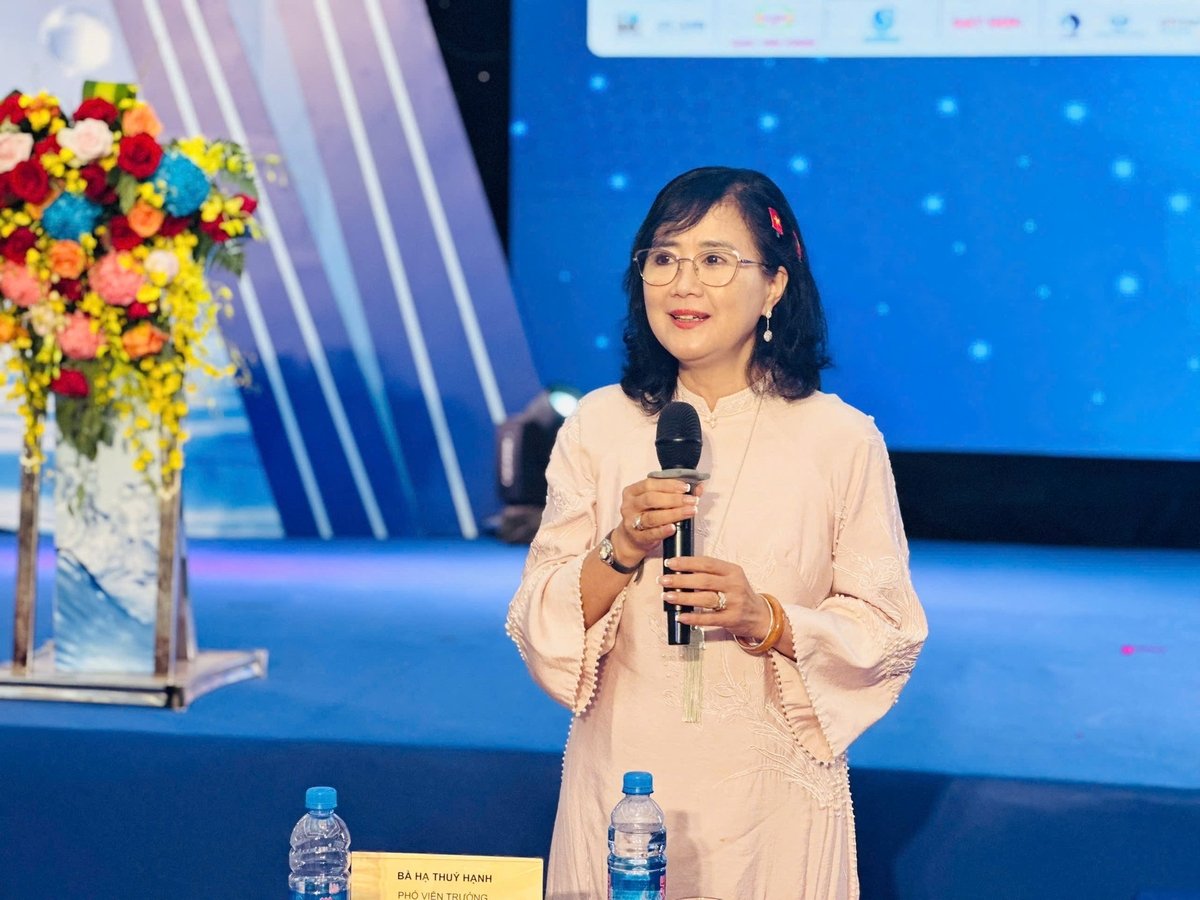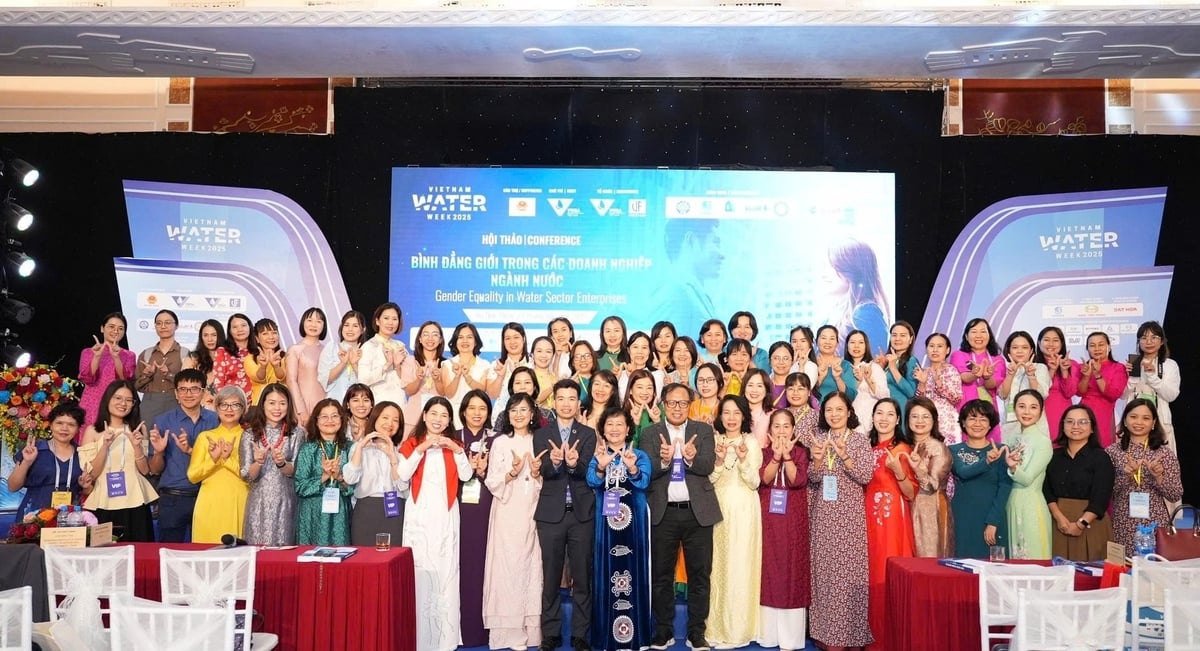November 26, 2025 | 21:02 GMT +7
November 26, 2025 | 21:02 GMT +7
Hotline: 0913.378.918
November 26, 2025 | 21:02 GMT +7
Hotline: 0913.378.918
On August 21, within the framework of the Vietnam Water Week 2025 organized by the Vietnam Water Supply and Sewerage Association (VWSA), the workshop “Gender equality in water sector enterprises” took place.
The workshop served as an open forum where managers, experts, and businesses reviewed the current situation, identified limitations, shared experiences, and sought solutions to promote gender equality in the water sector.
In his opening remarks, Mr. Nguyen Ngoc Diep, Chairman of VWSA, emphasized that the water supply and sewerage sector holds a particularly important mission in ensuring public health and protecting the environment. To fulfill this mission, the contribution of all staff and employees, regardless of gender, is essential.

Mr. Nguyen Ngoc Diep emphasized that promoting gender equality is a driving force for the sustainable development of enterprises in the Water sector. Photo: Nguyen Thuy.
In recent years, women have increasingly taken part in management, technical, operations, and customer service positions, demonstrating professional competence, creativity, and a strong sense of responsibility. They have overcome numerous barriers to affirm their role and position in the water sector.
However, Mr. Diep also candidly pointed out that gender stereotypes, gaps in promotion opportunities, and the lack of appropriate support policies for female employees still persist. Therefore, advancing gender equality must be considered a strategic priority both as a matter of social responsibility and as a driving force for the sustainable development of enterprises in the water sector.
The VWSA Chairman proposed four key solution groups to promote gender equality in the sector. Specifically, establishing fair recruitment, training, and promotion policies without gender discrimination; creating opportunities for women to participate in leadership, management, and technical fields; developing programs that support a balance between work and family life; and honoring as well as spreading the influence of exemplary female leaders who can inspire younger generations.
Mr. Diep expressed his confidence that with the joint efforts of enterprises, organizations, and individuals, Vietnam’s water sector will not only remain strong in terms of expertise but will also take the lead in advancing gender equality building a diverse leadership team ready to elevate the industry to new heights.
Presenting an overview of the gender equality survey in Vietnam’s water sector, Dr. Ha Thuy Hanh, Deputy Director of the Institute of Water and Environment (under VWSA), noted that according to a global report conducted by VWSA in collaboration with the Asian Development Bank (ADB) which surveyed 64 water companies representing 28 countries, women account for only 18% of the total workforce in the water sector.

Dr. Ha Thuy Hanh, Deputy Director of the Institute of Water and Environment under the Vietnam Water Supply and Sewerage Association (VWSA), presented an overview of the gender equality survey in Vietnam’s Water sector. Photo: Nguyen Thuy.
Not only is the number of women in the sector low, but the proportion of women holding managerial and leadership roles is also very limited, at just 23%. At higher levels such as Boards of Directors or Executive Boards, this figure drops to only 3% to 9%. Notably, as many as 32% of water companies have no female engineers at all.
These figures reflect the reality that gender equality in the workplace within the Water sector has not yet received adequate attention. This leads to a waste of human resources and hampers production development, as the sector fails to fully leverage the capacity, experience, and diverse perspectives that women can bring, especially in the context of digital transformation and the Fourth Industrial Revolution.
According to Dr. Hanh, the water sector has traditionally been seen as a highly technical field, associated with energy and heavy industry. For this reason, promoting gender equality requires even greater attention and stronger action.
She emphasized that to create real change, it is necessary to strengthen the presence of women in leadership positions in international organizations as well as in water supply and sewerage companies; at the same time, to implement initiatives, policies, and training programs on gender equality aimed at raising awareness, building skills, and empowering women. In addition, establishing a system of gender equality indicators for the water sector will enable companies to self-assess, adjust, and improve their capacity in a practical and sustainable way.
International experience has shown that enterprises with gender diversity in governance tend to achieve business performance 31% higher than those that pay little attention to this factor. Moreover, UNICEF has highlighted that in the context of climate change and resource scarcity, enhancing the role of women helps communities gain more sustainable access to water supply and sanitation services.
This demonstrates that gender equality is not only a matter of social policy but also an economic and governance lever that can enhance the water sector’s competitiveness.
Sharing at the workshop, Ms. Pham Thị Hong, Chairwoman of the Board of Directors of Dong Nai Water Supply Joint Stock Company (Dowaco), provided a practical example of efforts to promote gender equality within enterprises. According to her, leadership is not only about rational management but also about the ability to connect and inspire.

Delegates attending the workshop on "Gender equality in water sector enterprises" posed for a commemorative photo. Photo: Chung Anh.
Currently, at Dowaco, female employees account for 34% of the total workforce, including 14% on the Board of Directors and 20% at the middle management level. The company has built a working environment based on five pillars: equality, welfare, safety, creativity, and engagement. Notably, Dowaco has implemented various intensive training programs for female staff, encouraging them to participate in technical fields that have traditionally been considered a men’s domain.
Ms. Hong emphasized: "Gender equality cannot stop at being a slogan; it must become a culture and a policy. More importantly, there must be concrete measurement tools for enterprises to self-assess and improve." She also proposed that VWSA establish an annual gender equality award to encourage and replicate exemplary models.
Translated by Kieu Chi

(VAN) Minister Tran Duc Thang hopes to strengthen connections and exchanges with China in agriculture and environment sector through the Embassy of Vietnam in Beijing.

(VAN) After 50 years of strategic cooperation, Viet Nam and UNICEF remain committed to promoting fair and inclusive development for all children in the digital future.

(VAN) The final months of 2025 pose a significant risk of heavy rain and flooding in the Central region, with Typhoon Koto expected to make landfall in the coming days.

(VAN) At Mebi Farm, chickens consume a 100% vegan diet free from antibiotics, hormones, and banned substances. They live in a cool, clean environment, are never forced to lay eggs, and listen to music daily.

(VAN) The Disaster Prevention Community Fund has mobilized resources to install automatic rain gauge and flood warning stations, helping localities proactively respond to natural disasters more effectively.

(VAN) Thanh Hoa province has substantial potential to supply carbon credits, opening opportunities for green economic development, enhancing agriculture and forestry value.
/2025/11/25/1741-0-nongnghiep-221736.jpg)
(VAN) The application of AI helps identify emission sources and assess air pollution developments, thereby supporting management agencies in issuing timely and appropriate control policies.